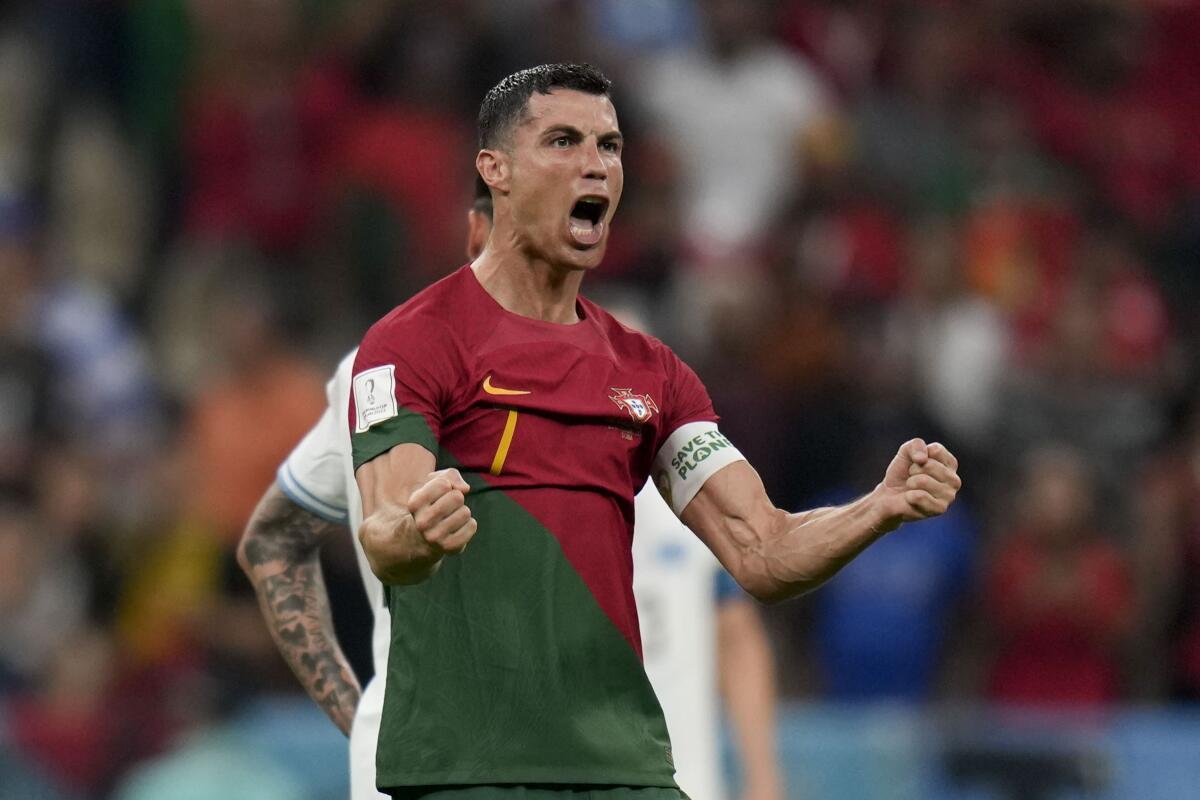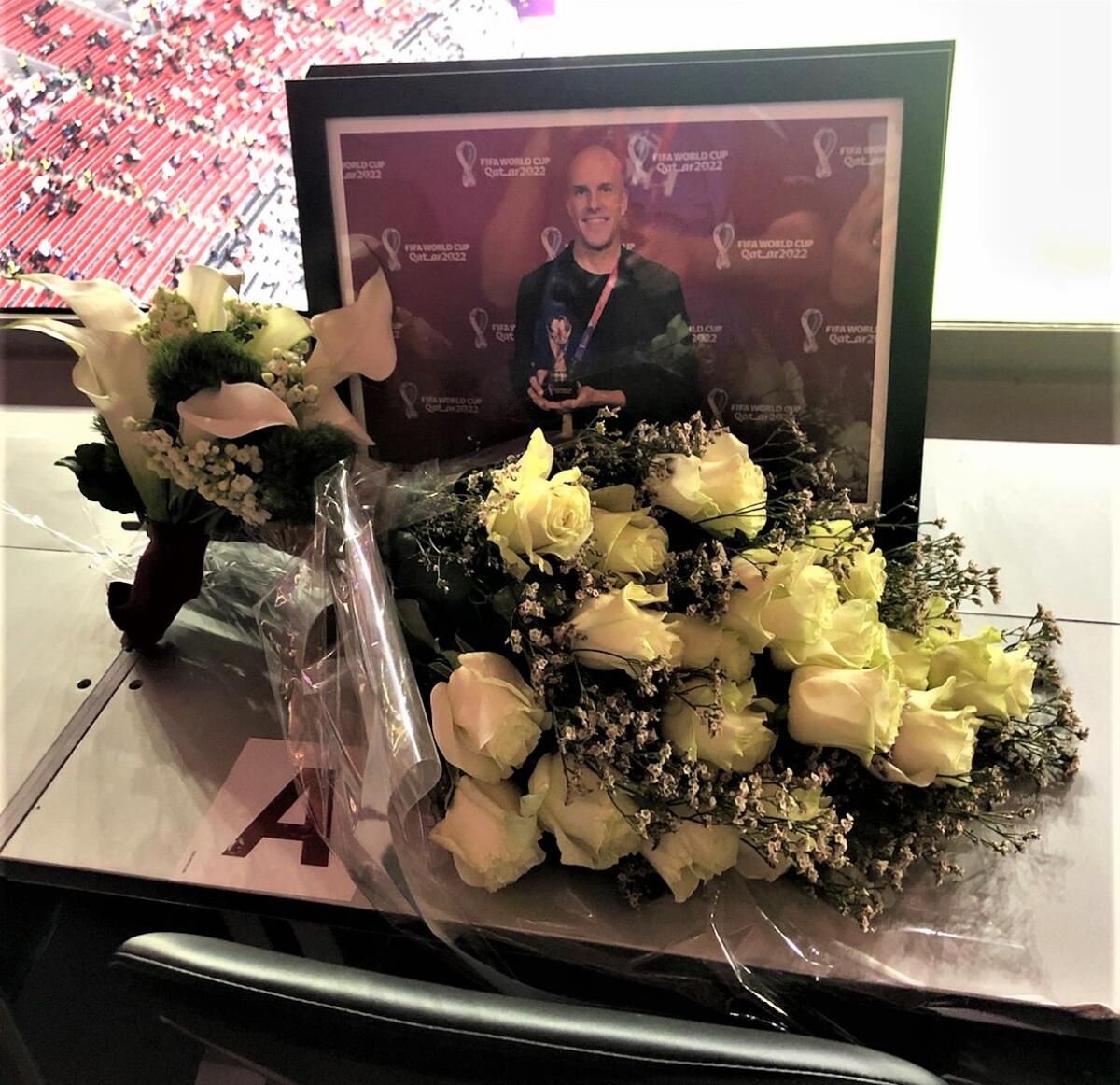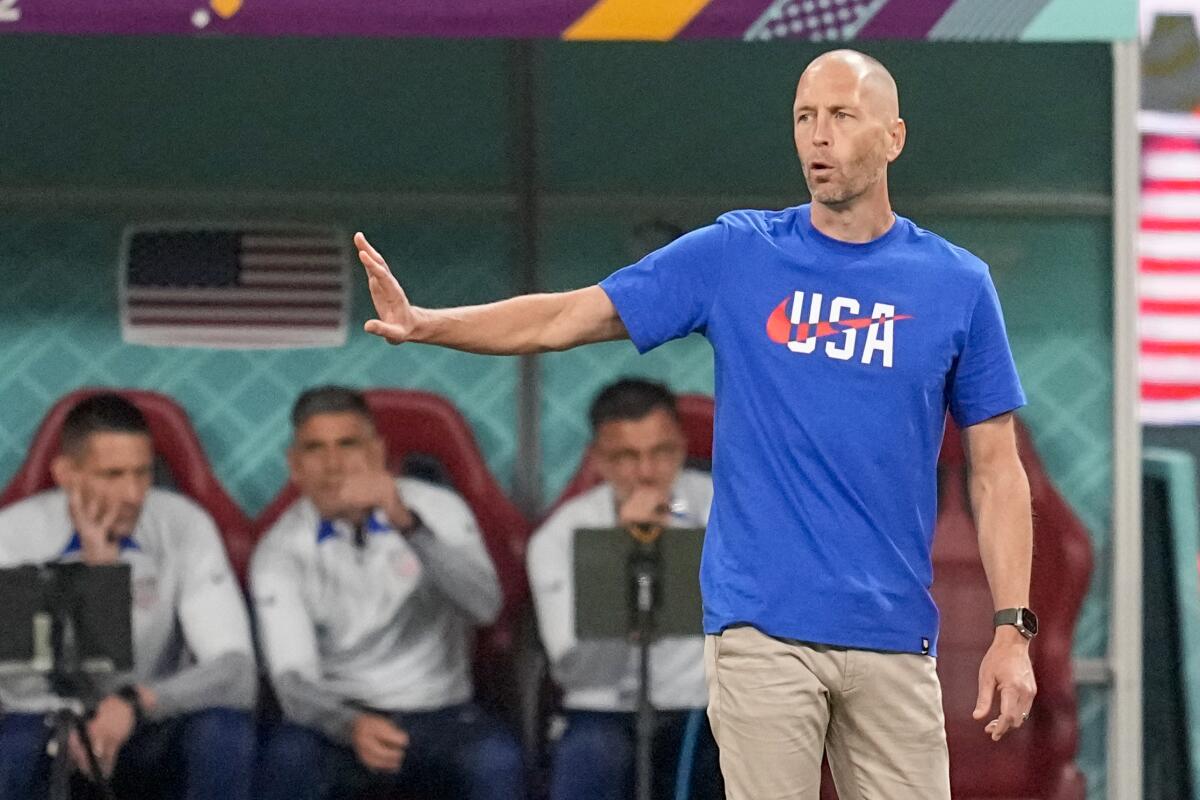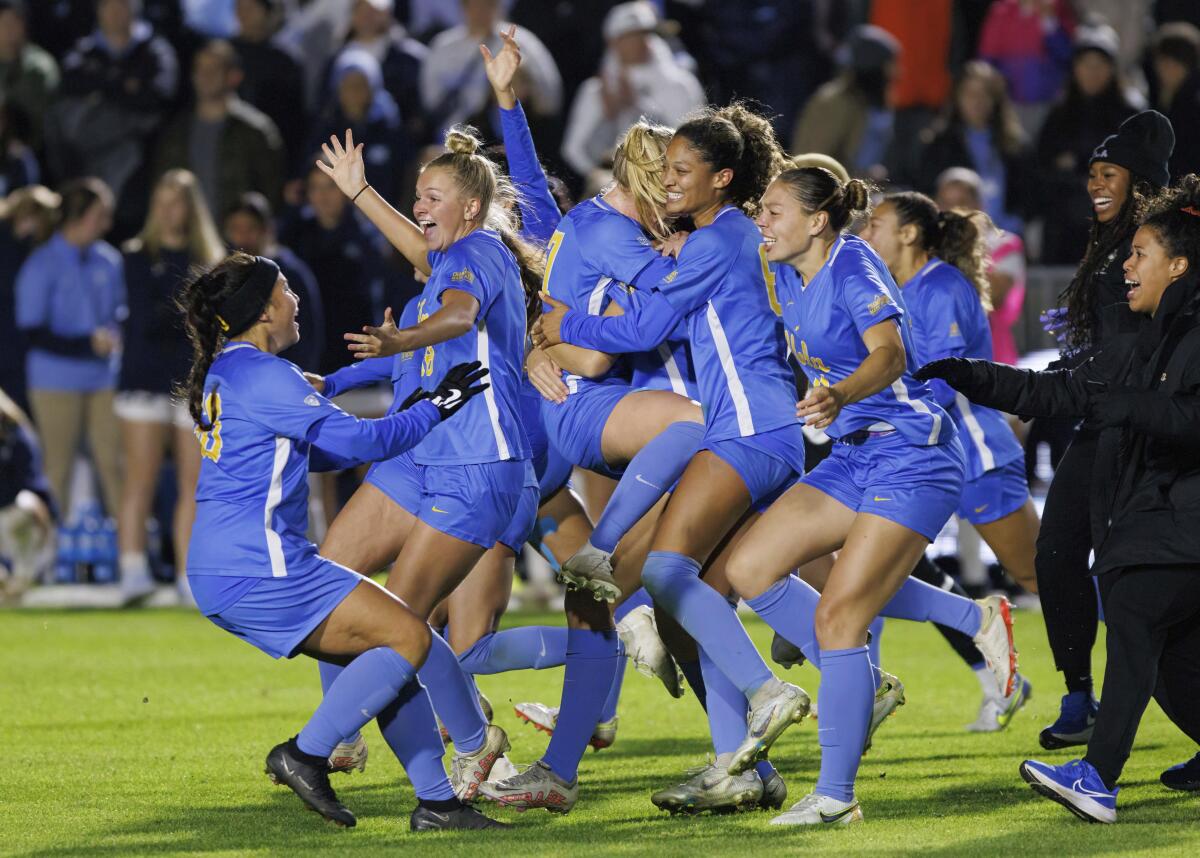Soccer newsletter: Cristiano Ronaldo continues to tarnish his legacy

- Share via
DOHA, Qatar — Hello and welcome to the weekly L.A. Times soccer newsletter. I’m Kevin Baxter, The Times’ soccer writer, coming to you again from the World Cup in Qatar, where we are down to four teams.
Today we’ll remember Grant Wahl, briefly explore the diversity of this tournament, wonder where all the fans have been, touch on the decision facing Gregg Berhalter and the U.S. national team and look at another first-year coach winning a title at UCLA.
But we start with the inexplicable soap opera saga of Cristiano Ronaldo. At 37, soon to be 38, this season with Manchester United probably was going to be his last in a top-flight European league. This World Cup, his fifth, certainly was going to be his last appearance in that tournament. All he had to do to collect a few hundred million more in salary and endorsements on his way out the door was to keep quiet and play. Then he could retire to a life of counting his money, commissioning statues of himself and living out his days as an iconic, larger-than-life hero.
But he couldn’t pull that off.
United terminated Ronaldo’s contract last month, midway through a season in which the player left the stadium during a preseason friendly in which he was subbed out at halftime and refused to enter a league game with Tottenham as a substitute, causing coach Erik ten Hag to leave him out of the squad for the next match with Chelsea.
Enjoying this newsletter? Consider subscribing to the Los Angeles Times
Your support helps us deliver the news that matters most. Become a subscriber.
In Qatar, Ronaldo scored on a penalty kick in Portugal’s opener, making him the only player with a goal in five World Cups. But in the second game he complained that a goal credited to teammate Bruno Fernandes really should have gone to him and in the third match, after being subbed out along with two other starters in the 65th minute, he muttered something to manager Fernando Santos as he exited, then threw his arms in the air before walking to the bench, where he sulked through the rest of the game.
Santos did not start Ronaldo in Portugal’s next two matches, the final one a 1-0 quarterfinal loss to Morocco that ended the team’s World Cup and might have ended Ronaldo’s international career while making Morocco the first African or Arab team to reach the semifinals of a World Cup.
How appropriate that Morocco’s success should come in the first Arab World Cup, the first held in the Middle East and the first held in a majority-Muslim country. Morocco will face France in Wednesday’s semifinal while Argentina will play Croatia in Tuesday’s game.
Ronaldo, meanwhile, walked off the international stage, perhaps for the last time, alone with his thoughts and his tears after bowing out in a game in which he had 10 touches, gave away possession five times and completed just three of six passes in 40 minutes.
It’s hard to say why Ronaldo snapped. He’s always been a selfish player; that’s how he scored a record 118 international goals while collecting fewer than 20 assists. But he also understood it’s hard to beat 11 opposing players by yourself; that’s how he won five Champions League titles, a European Championship and the UEFA Nations League.
The preening, the ego, the vanity always was part of the package with Ronaldo, but it was easier for teammates and coaches to accept when he was scoring 40 goals a season and winning six world player of the year awards. When Ronaldo became just another really good forward, the act grew thin.
He’ll still be remembered as one of the greatest players in history, the all-time leader in goals for club and country and a player who won multiple championships in England, Spain and Italy. But he’ll also be remembered for Qatar. While Lionel Messi willed Argentina to the semifinals by scoring four goals and assisting on two others, while Kylian Mbappe brought France goals and joy and while Morocco gave hope and inspiration to a continent, Ronaldo seemed to weigh down a team that could have gone further.
Exactly what happened in Portugal’s camp eventually will come out — sooner, probably, rather than later given the disappointment the players must feel at the early exit. Did Santos, who has coached Ronaldo and Portugal for eight years, overreact to his captain’s petulance? Or did Ronaldo’s behavior leave him no other choice?
“No regrets,” was all Santos would say.
Ronaldo was one of 10 players who did not leave Qatar with the rest of the Portuguese team Sunday evening. Where, exactly, he’ll go next is uncertain since he no longer has a club for which to play. But whenever he does leave and wherever he does go, he’ll be packing a lot of extra baggage for the trip.
Grant Wahl dedicated his life to soccer,
but didn’t want it to end there

The tributes have all suggested Grant Wahl died last Friday doing what he loved to do, which was covering a World Cup soccer game.
That’s a cliché, and a tired one at that.
Yes, Wahl, who was 49, loved soccer and had passion for the sport. His tenacious reporting and his gift for storytelling made him one of the country’s more influential voices for the sport over the last three decades. But he also loved his family. And nobody wants to die alone, 7,000 miles from home, in a stadium media tribune surrounded by colleagues.
Most foreign stadiums don’t have enclosed press boxes or suites as we do in the U.S. They have tribunes, which essentially are designated sections in the grandstands among the fans. Wahl, who was sitting directly behind me, lost consciousness and rocked back in his seat. This happened during extra time of the Argentina-Netherlands quarterfinal; Wahl had sent a tweet just moments earlier describing the tying goal.
Other reporters yelled for assistance and security guards responded quickly, followed by paramedics, who treated Wahl for about a half-hour. He wasn’t stretchered out of the media tribune until well after the game had ended. Wahl eventually was transported to Hamad General Hospital, where he was pronounced dead.
Wahl and his possessions have arrived in the U.S. from Qatar, U.S. State Department spokesman Ned Price said Monday. A U.S. embassy or consular official accompanied the body at all times, Price said.
Within hours of Wahl’s death stories began circulating suggesting there were nefarious reasons for it, linked to his critical reporting on Qatar’s poor treatment of migrant workers and LGBTQ rights. But Wahl had complained earlier in the week of feeling ill and said he had visited a medical clinic, where he tested negative for COVID-19. He said doctors told him he probably had bronchitis.
What, if anything, that had to do with his death will be investigated. Wahl was honored in Qatar for attending eight or more World Cups (his first was the 1994 tournament in the U.S.) and FIFA placed two dozen flowers at the seat he had been assigned for Saturday’s France-England quarterfinal. Dozens of journalists, FIFA officials and World Cup volunteers made their way to the top of the stadium and to the makeshift shrine to pay their respects during the game.
My strongest memory of Wahl is from the second game of the U.S.’s ill-fated qualifying campaign for the 2018 World Cup. After a dismal 4-0 loss in Costa Rica that dropped the team to 0-2, Wahl asked coach Jurgen Klinsmann the question that was on everyone’s mind: “Do you still think you’re still the best person to lead this team?”
Klinsmann never coached another game for the U.S.
“His love for football was immense and his reporting will be missed by all who follow the global game,” FIFA president Gianni Infantino said in a statement.
His love for football was immense, but so was his love of life and his love of family. Wahl appreciated and cherished his time in soccer stadiums; he visited hundreds on six continents. But he surely never wanted his life to end in one of them.
Nation building
The World Cup, soccer’s global championship, is contested by national teams. But what, exactly, makes a person eligible to play for a national team?
Generally, FIFA has allowed a player to represent any national team as long as the player held citizenship of that country. But when countries began to abuse that by naturalizing players with the intent of having them play soccer, FIFA implemented significant changes to its guidelines that required players to demonstrate a clear connection to any country they wished to represent. The new rules say a player is eligible to represent a country internationally if:
a) He/she was born on the territory of the relevant association; b) His/her biological mother or biological father was born on the territory of the relevant association; c) His/her grandmother or grandfather was born on the territory of the relevant association; d) He/she has lived continuously for at least five years after reaching the age of 18 on the territory of the relevant association.
So why do we care? The World Sports Network (WSN), an independent online sports and betting guide, crunched all 32 World Cup rosters (for some reason) and came away with a lot of interesting information regarding nationalities. For instance, 17% of World Cup players — nearly one in five — were not born in the country they represent.
Here are some more fun facts:
Passports, please: Only four countries at this World Cup fielded teams whose players were all born in that country — Argentina, Brazil, South Korea and Saudi Arabia. Qatar, Wales, Senegal, Tunisia and Morocco, meanwhile, have the lowest number of native-born players. Fewer than half of Morocco’s roster was born in that country.
Made in (South) America: South American countries feature the most native-born players, with Argentina and Brazil having 100% and no South American side featuring fewer than 92% homegrown players.
Vive la France!: France has sent the most players to this World Cup, with a massive 61 players representing 10 countries.
Most native-born players on each country’s roster:
26: Argentina, Brazil, South Korea
25: Saudi Arabia, England, Netherlands, Denmark, Belgium, Costa Rica, Japan, Mexico, Uruguay
24: Iran, Germany, Spain, Ecuador, Poland
23: France, Switzerland
22: Serbia
21: U.S.
19: Croatia, Canada, Portugal
18: Ghana
17: Cameroon, Australia
16: Qatar, Wales
14: Tunisia, Senegal
12: Morocco
The five countries with the most native-born players in Qatar:
France: 61 players on 10 national teams
England: 42 players on six teams
Germany: 32 players on seven teams
Spain: 31 players on six teams
Netherlands: 30 players on three teams
These countries didn’t qualify for Qatar but sent players with other national teams
Bosnia and Herzegovina, Scotland: Four players each, representing two countries
Italy: Three players, representing three countries
Angola: Two players, representing two countries
Austria: Two players, representing two countries
Flood into Qatar more like a trickle
Good thing all those players came in from so many countries because, according to Reuters, the influx of international fans was significantly lower than projected. The Qataris viewed this World Cup as a chance to showcase their country and said more than 1.2 million people would flood the tiny Gulf state during the 28-day tournament.
But Reuters reported last week just more than 765,000 showed up during the first two weeks of the tournament, when all 32 teams were still playing. A huge surge in visitors is unlikely in the final week with only four teams still alive.
The report Reuters cited, dated Dec. 7, was prepared by the Supreme Committee for Delivery and Legacy, the local organizing committee. It said the first 17 days of the World Cup saw 765,859 international visitors, more than half of whom have departed.
The report registered 1.33 million match ticket holders and 3.09 million tickets sold for the tournament, which ends Dec. 18. The average expected attendance of 48,281 would be slightly higher than the figure four years ago in Russia but would trail the three previous tournaments in Brazil, South Africa and Germany.
Berhalter, U.S. Soccer taking ‘time to reflect’

The U.S., which went out more than a week ago, will start the new World Cup cycle in a month when it opens its first training camp of 2023 at Dignity Health Sports Park. But will it have a coach when it does so?
Gregg Berhalter’s four-year contract runs out at the end of the year and it’s uncertain whether he’ll be back. Berhalter reportedly is listening to other offers while U.S. Soccer is considering its next move.
“As we always do after a major tournament, we are taking time to reflect,” Earnie Stewart, U.S. Soccer’s sporting director, said in a statement. “We will conduct a full review with everyone involved as we determine our next steps. We look forward to building off the performance in Qatar and preparing for the journey towards 2026.”
That review will probably include the Gio Reyna situation. Reyna was little-used in Qatar, apparently because he quit on the team early in the tournament and wasn’t giving a full effort in training, which led to his benching. Several players pulled Reyna aside and tried to motivate him, to little avail. Berhalter said after the tournament that he and his staff almost sent a player home for a lack of effort but did not name the player.
Reyna was making his national team debut under Berhalter, who went to high school with Gio’s father, Claudio. Berhalter and the elder Reyna played together in the 2002 World Cup.
Before leaving Qatar after his team was eliminated in a 3-1 loss to the Netherlands in the round of 16, Berhalter said he needed time to work out his next move.
“For the last month, month and a half, I just only focused on the World Cup and focused on achieving things with this group,” he said. “The next couple of weeks, I’ll clear my head, I’ll sit down and think about what’s next.”
Berhalter auditioned 88 players in 60 games, went 37-11-12 and won the Gold Cup and Nations League tournaments. His winning percentage of 71% is the best for a men’s national team coach who managed more than two games, and the team’s average of 1.95 goals a game is the best for a U.S. men’s coach who has managed at least 10 games.
Berhalter also helped put together a U20 team that qualified for the 2024 Paris Olympics. His team, the second youngest in the World Cup, was the only one from CONCACAF to get out of group play and Berhalter has won positive reviews for his ability to get a young team to perform, something which has won him attention in Europe where he previously coached with Hammarby IF in Sweden’s first-tier Allsvenskan.
Another first for UCLA

It appears as if the key to success for UCLA’s women’s soccer team simply is hiring a new coach.
The Bruins have won their only two national titles in the last decade and both came in the first season under a new coach, in 2013 with Amanda Cromwell and last week under Margueritte Aozasa, who replaced Cromwell last winter.
That’s kind of where the similarities end, though. Both teams won 22 games in their championship seasons, but Cromwell’s team rolled through the NCAA tournament, gave up just a goal in its six postseason games and won the final 1-0 over Florida State. This year’s team had to work a little harder; it won its second-round game over UCF on penalty kicks, beat Virginia in overtime in the quarterfinals and then rallied from a two-goal deficit in the final 10 minutes of the final before beating North Carolina when Maricarmen Reyes’ goal in the second extra-time period gave UCLA its only lead.
The Bruins sent the game to extra time when junior forward Reilyn Turner scored off freshman Ally Lemos’ corner with 16 seconds to play. Sophomore Lexi Wright got the first goal in the 80th minute. Both the first and third UCLA goals came off rebounds.
“That was incredible, I can’t say enough about the belief this team has and the care they have for each other,” Aozasa said. “The roller-coaster of emotion I think we all felt. I cried many times during that game — happy and sad.
“To be down 2-0 with 10 minutes left, to be down a goal with less than a minute left, and to come back and then not even go to PKs but win in overtime is something incredibly special and it speaks to the character of the entire team.”
Aozasa, a former Stanford assistant, made history as the first person in NCAA women’s soccer history to win a national championship in their first year as a head coach (Cromwell had coached at two other schools before coming to UCLA). Aozasa also became just the fourth female head coach and second Asian American head coach to win a title.
“This is one of the greatest finals I’ve personally ever been involved in,” said North Carolina coach Anson Dorrance, who has been involved in several, having won a record 21 NCAA titles. “Up and back, lots of goals, overtime. The drama of sport — one team goes up, the other one claws their way back.
“I think everyone that participated in it, from the players on both rosters, ought to be credited, because this was a wonderful sales piece for the women’s collegiate soccer game.”
Six of UCLA’s 11 starters in the championship game were undergraduates.
And finally there’s this …
The Galaxy’s trade of Kévin Cabral to the Colorado Rapids for $1 million in general allocation money will offset the $1 million in GAM the team was fined for violating MLS salary guidelines in the 2019 acquisition of Argentine winger Cristian Pavón. The allocation money will be paid over the next two seasons, with $600,000 due in 2023 and the rest in 2024. The trade also frees up a designated-player spot for the Galaxy and creates a fresh start for a player who came to MLS with a great pedigree and obvious talent, yet never matured into the player coach Greg Vanney projected him to be when the team acquired him in the winter of 2021. Cabral scored eight goals and had five assists in 65 games and 50 starts in all competitions for the Galaxy. He was paid $1.65 million last season on a contract that runs through 2026.
Our World Cup coverage
For all of our World Cup coverage, visit our World Cup page here.
In case you missed it
World Cup schedule: Start times for every match and how to watch
How ultimate underdog Morocco became ‘the Rocky of this World Cup’
World Cup semifinals: How to watch Argentina-Croatia, France-Morocco
There was something Bourdain-like about the big, soccer life Grant Wahl led
World Cup that began with controversy and uncertainty will end with history being made
Quotebook
“You come in as an underdog and then you win. It’s Arab pride. All Arab countries were here in the stadium supporting Morocco.”
Saleh al-Rayes, a 27-year-old fan from Saudi Arabia in Doha, speaking to the Associated Press about Morocco becoming the first African country and first Arab nation to reach the World Cup semifinals
Until next time...
Stay tuned for future newsletters. Subscribe here, and I’ll come right to your inbox. Something else you’d like to see? Email me. Or follow me on Twitter: @kbaxter11.




